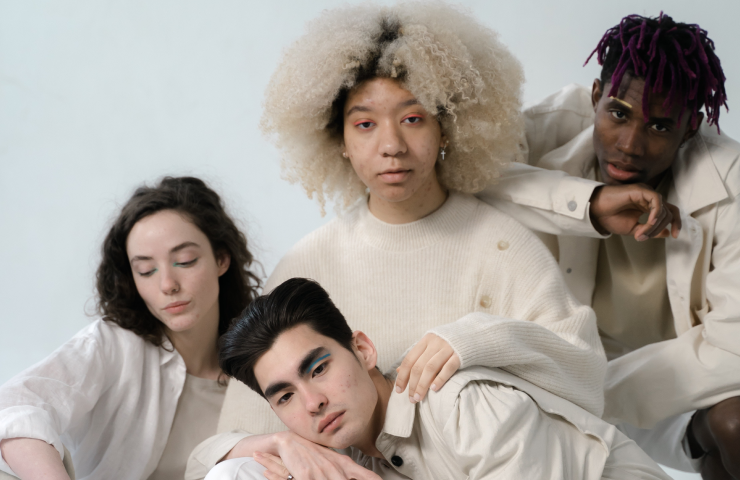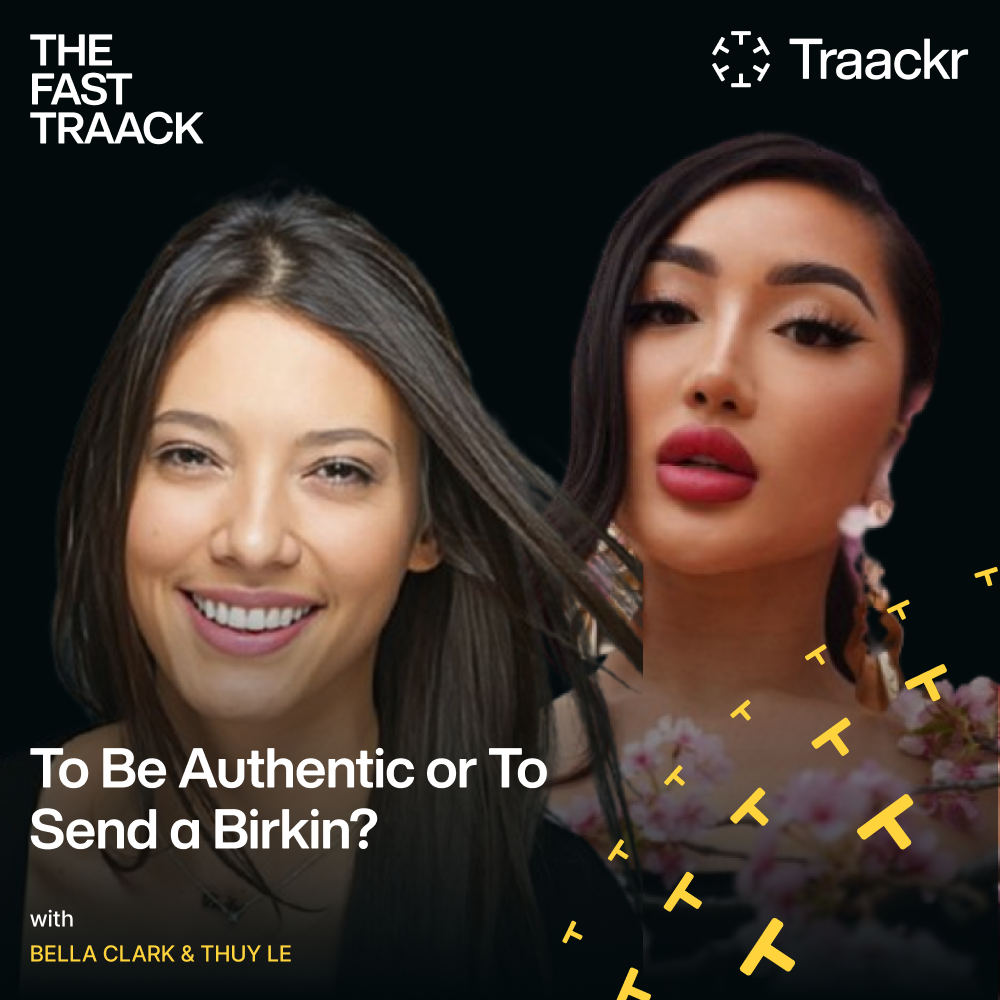The Evolution of the Beauty Industry, According to Creators

The beauty industry used to be more-or-less synonymous with makeup products like lipsticks, foundation, and hairspray. Now, the beauty industry is rapidly evolving due to the acceleration of technology and the changing ideology of what “beauty” means. In fact, when we asked creators how they define beauty, a lot of them gave responses like “reflecting your best inner-self onto the world" and “taking a holistic self-care approach.”
We interviewed creators, Paula Carozzo, Saleam Tyree Singleton, Laura Hill, and Mykel Nerí Saucedo to learn more about how they think the beauty industry is evolving, and how it will impact brand partnerships in 2022 and beyond.
Rising platforms and return to in-person events
According to our 2021 State of Influencer Markering report with Glossy, 85% of marketers use Instagram Stories in their influencer marketing strategy, followed by stagnant Instagram posts (78%).
However, creators are experimenting with platforms like TikTok, Pinterest, and Twitch where they can produce new, exciting, and engaging content.
“I'm excited to do more partnerships on TikTok. It's really cool over there. People underestimate the power that adults have on the app, especially in beauty.” - Saleam Tyree Singleton
In-person events were also on the top of creators’ minds when we spoke with them in 2021 - before the Omnicron variant surged. Paula claimed that she’s excited to start traveling again to attend conferences and events as the world begins to open up again.
“Coming from an experiential marketing background, in-person events have always been a thing I’ve enjoyed. I miss connecting with people face to face, and look forward to that.” - Mykel Nerí Saucedo
The need for purpose and diversity
Creators want to work with brands that truly align with their personal values. In his response Saleam noted how important it is to work with brands who are genuinely interested in what he represents, “not just in what they say, but in what they do.”
Laura, similarly, cares about working with brands that have integrity and create space for inclusivity.
An analysis of data from social content created by 42,603 influencers in the US, Canada, and Europe confirms this sentiment on a broader scale. Influencers and their audiences are certainly talking more about and engaging with purpose-driven topics like sustainability, transparency, and mental health.
Content Mentioning Environmental/Sustainable Terms Across All Platforms:*
- +4% activated influencers
- -23% posts
- +36% engagements
- +16% video views
Content Mentioning Transparency Terms Across All Platforms:*
- -4% activated influencers
- -14% posts
- +96% engagements
- +81% video views
Content Mentioning Mental Health Terms Across All Platforms:*
- -5% activated influencers
- -6% posts
- +9% engagements
- +27% video views
This desire for aligned values is also functional. Many influencers indicated that working with aligned purpose-driven brands makes for better, and more authentic content.
It's definitely a game and varies by brand and scenario. I always need a brand to align with my brand on ethics, values, and goals. If we don't align and things don't feel right, it just won't work. The content won't be authentic. - Paula Carozzo
*Date Range: 2019-October 2020 vs November 2020 - October 2021
How brands can take action
Experiment alongside influencers.
If they're trying out new platforms, content types, and creative ideas it's likely because they've noticed some rising demand from their audiences. Working on controlled experiments with influencer partners can help you learn new things quickly, and maybe even get on a new trend from the get-go.
Find or define your brand purpose.
Rising brands like Rare Beauty, Thrive Causemetics, and Beekman 1802 have built sustainable brand affinity by prioritizing community and purpose.
In a recent interview on our podcast, Tiffani Carter, VP of integrated marketing at Thrive Causemetics shares that “any decision we make is about nurturing the community by building the community, and... a lot of that is rooted in our causes.” She went on to say that she feels that investing in and expanding the visibility of their causes will be a “game-changer” for the brand.
From the creator's perspective, Mykel agrees saying, “brands can sell and still be authentic. Take Rare Beauty by Selena Gomez - a brand so accessible to the consumer. They not only have shown us how beautiful one can look and feel in their own skin, but they also advocate for mental health and share more than just beauty being glitter. I love that!”
Embrace diversity.
76% of Gen Zers feel diversity and inclusion are important topics for brands to address. One of the first steps brands can take is to invest in diverse influencers. True representation makes a difference, and influencers can help fill the holes that are caused by a lack of diverse representation.
“I was at a brand launch recently for a high-end fragrance brand, and they used a Black woman as one of their models. I walked up to one of the founders and thanked him. I don't think people realize how empowering representation is. I told him, ‘it's important for Black women to be able to see themselves in the universe you've created.’ It's not simply a matter of diversity - black women already know their buying power. It's about being seen. That goes a very long way.” - Saleam Tyree Singleton
Ask your creators and consumers for feedback.
Create spaces to invite open conversations, and start asking your influencers questions! Influencers are much more than digital billboards for product placement. Start harnessing their true value and embed them more into your brand’s DNA.
Whether it’s product feedback, content production or even counseling on how to respond to societal problems, there are now new opportunities for brands to partner with influencers in meaningful ways.
Meet the creators
- Paula Carozzo (@pauuzzo): Paula is an inclusive lifestyle influencer who focuses on being honest, innovative with community at the core of her work.
- Saleam Tyree Singleton (@themethodmale): Saleam focuses on the empowerment and representation of men of color in the beauty industry. His goal is to create a normalized presentation of men and self-care.
- Laura Hill (@laurafromsephora): Laura is a makeup and skincare expert that focuses on ageless beauty.
- Mykel Nerí Saucedo (@mykelsaucedo): Mykel is a licensed esthetician and nano influencer who focuses on skincare and beauty.

Listen to Bella Clark, Head of Influencer and Partnerships at Lipton, and content creator, Thuy Le, share why authenticity outshines extravagance when it comes to creator partnerships.
Listen nowSee which brands are leading the way in influencer marketing with our real-time performance leaderboard.
View brand leaderboardLevel up your creator marketing expertise
Get industry insights and updates straight to your inbox.
.jpg)
%20(1).jpg)
.jpg)
.jpg)